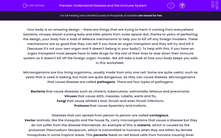Your body is an amazing design - there are things that are trying to harm it coming from everywhere: bacteria, viruses, blood-sucking bats and killer plants from outer space! But, thanks to years of perfecting the design, your body has a load of defence mechanisms to help you to kill off any foreign invaders. These mechanisms are so good that they can tell if you have an organ transplant and they will try and kill it (because it's not your own organ and it doesn't belong in your body!). To help with this, if you have an organ transplant most people have to take drugs for the rest of their lives to slow down their immune system so it doesn't kill off the foreign organ-invader. We will take a look at how your body keeps you safe in this worksheet.
Microorganisms are tiny living organisms, usually made from only one cell. Some are quite useful, such as yeast that is used in baking, but most are quite dangerous, as they can cause disease. Microorganisms that cause disease are called pathogens. There are four types of pathogens:
Bacteria that cause diseases such as cholera, tuberculosis, salmonella, tetanus and pneumonia.
Viruses that cause AIDS, measles, rubella, warts and flu.
Fungi that cause athlete's foot, thrush and even throat infections.
Protozoa that cause dysentery and malaria.
Diseases that can spread from person to person are called contagious.
Vector animals, like the mosquito and the house fly, carry microorganisms that cause a disease but they do not suffer from the disease themselves. An example of this is malaria, which is caused by the protozoan Plasmodium falciparum, which is transmitted to humans when they are bitten by female mosquitoes in some tropical areas. This parasite feeds on red blood cells from humans causing fever which can often be fatal.
Fortunately, our body can fight pathogens with the help of white blood cells. This is active immunity as our body actively tries to fight disease. Medical research has developed antibiotics and vaccines to save even more lives. This is called passive immunity.
Let's move on to the questions now.








